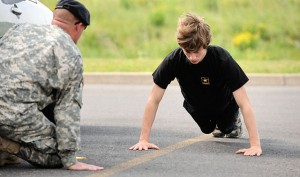Ready, Willing And Unable To Serve
Ready, Willing And Unable To Serve
 Last year an organization based in Harrisburg, Pennsylvania, Mission: Readiness – Military Leaders for Kids, published a report with the title, “Ready, Willing and Unable to Serve.” I don’t know the date that the report was formally published because it didn’t give a date of publication. All it had was a copyright of 2009.
Last year an organization based in Harrisburg, Pennsylvania, Mission: Readiness – Military Leaders for Kids, published a report with the title, “Ready, Willing and Unable to Serve.” I don’t know the date that the report was formally published because it didn’t give a date of publication. All it had was a copyright of 2009.
At the beginning of the report there was a message that was signed by seven retired generals of the U.S Army, one of which was Henry “Hugh” Shelton, former chairman of the Joint Chiefs of Staff. In the message, the generals stated:
“Unfortunately, many young people who want to join the military cannot. In fact, the Pentagon is reporting that 75 percent of all young adults ages 17 – 24 in America are unable to join the military. Too many young men and women lack a high school diploma, are in poor physical shape, or have a criminal record.
The United States military must continue to insist on rigorous eligibility standards because it needs competent, healthy and educated individuals to staff the world’s most professional and technologically advanced military. If we want to ensure that we have a strong, capable fighting force for the future, we need America’s youth to succeed academically, graduate from high school, be fit, and obey the law.”
The report quoted various experts and referenced studies from Michigan and Pennsylvania to support its conclusion that “quality early education,” starting with preschool, is the strongest factor in contributing toward increased graduation rates and reduced criminal activity. In support of its findings, the report stated:
“The first years of life build the foundation for what comes later. The ‘school readiness skills’ are more than just learning the ABC’s or learning how to count. Young children also need to learn to share, wait their turn, follow directions, and build relationships. This is when children begin to develop a conscience – differentiating right from wrong – and when they start learning to stick with a task until it is completed.”
While the report backed up its findings with 24 footnotes, there was not one mention of the importance of the family in teaching children how to share, wait their turn, follow directions, build relationships, and differentiate right from wrong.
How is it that the “educated” adults who drafted this report failed to address the number one critical factor in the development of responsible children?
Even though the studies that were referenced in the report showed that children who started their education with preschool had a much higher likelihood of finishing high school, the researchers apparently didn’t have the sense or curiosity to dig deeper in order to find more important factors that may have helped those children to succeed in life. Why not take a look at the environment the children grew up in? Wouldn’t you think that an investigation into the family life of the children would have revealed other important factors that contributed to their success?
What is most frustrating to me is that a lot of the people who end up in positions of leadership fail to recognize (or acknowledge) what is right in front of their faces. In my opinion, if the individuals who wrote the report had looked deeper into the reasons children were so dysfunctional, they would have found a direct link to the families of those children. Unfortunately, such a finding would have created conflict and dissention. So they took the easy way out.
Now don’t get me wrong here. I’m not questioning the value and importance of preschool education. What I am questioning is the overly simplistic conclusions of the report. An honest assessment of the problems would have led to some unpopular (and controversial) recommendations concerning the development of stronger families.
A few suggested recommendations could be: (1) change the laws that make it too easy for couples to obtain “no-fault” divorces; (2) re-engineer the tax code to favor married couples with children; (3) give parents annual vouchers that have a value that is equivalent to what it costs the state to educate their children and allow those parents to use the vouchers to shop around for the best school for their children; and (4) change the laws to allow for prayer in the public schools, as well as the teaching of the ten commandments and creationism as an alternative to evolution.
So what do you think would work best in helping children to differentiate right from wrong, succeed academically, graduate from high school, and obey the law – the four things I just recommended … or preschool?
Unfortunately, the people who have the responsibility of educating our children have had their hands tied by the lawmakers and bureaucrats who are in charge of making policy.
After reading the report that the generals signed off on, I thanked God for my parents and the sacrifices they made for me and my brothers and sisters. Fortunately for me, I was the son of devout Catholics who took their role as parents seriously (and both of my parents were fortunate enough to be the children of devout Catholics who also took their role as parents seriously).
For what it’s worth, none of my classmates in grade school and high school went through preschool. In fact, several of them didn’t even go through kindergarten, yet because the vast majority of them came from good solid families, they succeeded academically, graduated from high school, were fit, and obeyed the law. Schools cannot and will not ever replace families.
The family of Jesus, Mary and Joseph was the “Holy Family.” It’s never too late to work toward making your family a holy family. We cannot afford to allow our so-called “leaders” to impose their opinions and “values” on our children. That job was given to us by God and should not (and cannot) be delegated to someone else. It’s up to each of us to sacrifice and do whatever is necessary to make sure our children and grandchildren grow up in the same kind of holy family our Lord grew up in – a family filled with love, faith, hope, prayer, grace, joy, and loving (and merciful) discipline.
Now that’s the way to raise children who are ready, willing and able to serve.


